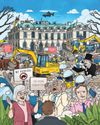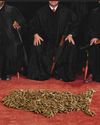
SINCE THE post–World War II rise of suburbia, the great American lawn has beckoned with the promise of a grassy, orderly Eden surrounding a single-family fortress. For just as long, lawns have been sending bees and other pollinating critters the opposite message: Buzz off.
That’s because the very essence of a lawn (closely shorn, uniform, weed-free) leaves little room for the sustenance that pollinators depend on—pollen and nectar from a variety of flowers. Residential landscaping is contributing to an alarming ecological crisis: a steep decline in the health of pollinating animals, whose services provide one-third of the food we eat. They don’t just power the supermarket produce aisle; pollinators keep forests, parks, and shrublands humming.
This story is from the May/June 2020 edition of Mother Jones.
Start your 7-day Magzter GOLD free trial to access thousands of curated premium stories, and 9,000+ magazines and newspapers.
Already a subscriber ? Sign In
This story is from the May/June 2020 edition of Mother Jones.
Start your 7-day Magzter GOLD free trial to access thousands of curated premium stories, and 9,000+ magazines and newspapers.
Already a subscriber? Sign In

HOG WILD
The scandalous reason meat prices have skyrocketed

ALL WALKS
Limiting cars in cities can help disabled people, too.

REMIGRATION
How Trumpism is following the far right in Europe toward mass expulsion of immigrants

SETTLING THE SCORE
A pop psychology book is considered the definitive trauma text. But what if it's leading survivors down the wrong path?

Positive Spin
People with e-bikes drive less, pollute less, parkinglots-and that's only part of why cities and states are embracing them with gusto.

Cradle and All
The devastating cost of Utah's thriving adoption industry

THE BILLIONAIRE WHO NEARLY BROKE NEWPORT
TRUMP MEGADONOR STEPHEN SCHWARZMAN'S EXTREME MANSION MAKEOVER IS DRIVING HIS NEIGHBORS NUTS.

THE SECRET PLAN TO STRIKE DOWN US GUN LAWS
AND THE COP-TURNED-PASTOR AT THE CENTER OF IT ALL

GOOD NIGHT AND GOOD LUCK
Election Day inside a bustling broadcast newsroom that no longer exists

MASTER OF DISASTER
Trump won’t confront the climate crisis. He’ll feast off it.